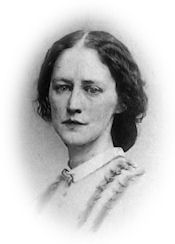 Abby Howland Woolsey to Georgeanna.
Abby Howland Woolsey to Georgeanna.
New York, April, ‘62.
I notice what you say of bed sacks. The Sanitary Commission furnished thousands to the Burnside Division for its hospitals at Roanoke. Charley says not one of these was ever filled or used, there not being a wisp of hay or straw or moss or anything, except what was brought there for forage. The men all lay on the board floors. At Fort Monroe it might be easy to send down from Baltimore ready-made mattresses, or the material for filling, but I question whether anyone on the spot would take the trouble of seeing them applied. You could mention the instance of Roanoke to the Sanitary Commission to prove to them that mere sacks are not enough. .. .
Yesterday when I came in from Mary’s, I found “Robert Anderson, U. S. A.” ’s card on the table again. John said he bade him say General Anderson called in person to thank Miss Carry Woolsey for the flowers. . . . James Gibson writes from Belfast that “England did not want war with America, and special prayer meetings for peace were held”; but wasn’t it Earl Shaftesbury who refused to attend, saying such an act would place him in hostility to his government? If England did not mean war, why did she fly to arms in that indignant and indecent haste! Why did Lord Palmerston suppress the nature of the despatch from Seward, read to him by Mr. Adams, and even allow it to be contradicted in his organ the Post? No; two things will always stand on record as showing the hostility of the governing class in England toward America in its life and death struggle;—this hurry to make a casus belli of what ought to have been a question for diplomacy to settle; and that first great wrong done us in the outset, when the English ministry, while Adams was on the railway train, the very day he was on his way from Liverpool to London, last May, hastened to declare the North and South equal belligerents. They confound the law-power and the law-breaker; they call the police and the burglar brother-rogues. . . .
It is just as Mr. Scharff’s father said at the very beginning of the war, “Well, John, I don’t know what part England will take in this matter, but I am very sure of one thing, it will be the meanest part, possible.” . . .




